Between shadow and light
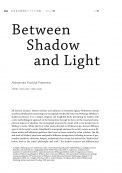
Aleksandra Kosicka-Pajewska
A b s t r a k t
Ewa Szkudlarek’s book Portrety cieni Witkacego [Witkacy’s shadow portraits] is an innovative look at the work of Stanisław Ignacy Witkiewicz. (...)

A b s t r a k t
Ewa Szkudlarek’s book Portrety cieni Witkacego [Witkacy’s shadow portraits] is an innovative look at the work of Stanisław Ignacy Witkiewicz. (...)
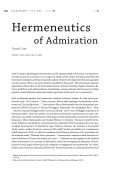
A b s t r a k t
This essay discusses Adrian Gleń’s book Andrzej Stasiuk. Istnienie, which refers to the hermeneutical tradition in literary studies. (...)
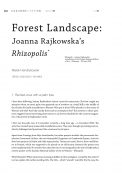
A b s t r a k t
The article is an analytical and interpretative study of the poetics of the two newest art installations by Joanna Rajkowska. (...)
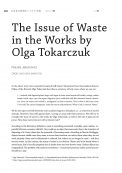
A b s t r a k t
The paper discusses the issue of waste and plastic, especially plastic bags, in the works by Olga Tokarczuk. The author considers what waste is in today’s civilization. (...)
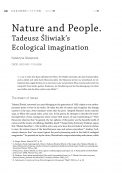
A b s t r a k t
This article examines the ecological imagination of the forgotten poet form the 1956 generation, Tadeusz Śliwiak, and his poem Oratorium [Oratorio] published in the volume Widnokres [Horizon] (1971), in the section entitled Ziemia [Earth]. (...)
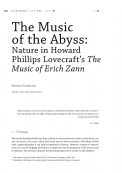
A b s t r a k t
The article analyzes Howard Phillips Lovecraft’s short story The Music of Erich Zann, with a view to presenting the conflict between modernity and nature in Lovecraft’s works. (...)
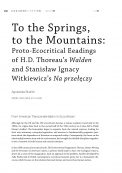
A b s t r a k t
In the article, I focus on the comparative approach to the images of nature in literature at the turn of the 19th and 20th centuries. I analyse H.D. (...)
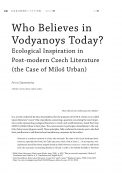
A b s t r a k t
Miloš Urban, a Czech writer, is mostly associated with postmodernist playing with the convention of the metaphysical thriller. In 2001 he published Hastrman, a novel representing so-called green literature, for which he received the prestigious Magnesia Litera award. (...)
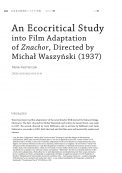
A b s t r a k t
The paper discusses a 1937 film directed by Michał Waszyński, also considering the novel written by Tadeusz Dołęga-Mostowicza which became the source of the screenplay, and the second adaptation of this novel directed by Jerzy Hoffman in 1981. (...)
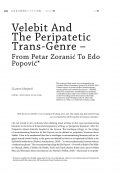
A b s t r a k t
The article interprets Velebit as a space of peripatetic literature beginning, naturally, with Petar Zoranić’s Planine (written in 1536 and published in 1569) wherein, in addition to a personal psychogram on conventional lovesickness (“beteg”), the author problematizes the general situation in his “scattered heritage” (“rasuta bašćina”) (under Ottoman and Venetian threat). (...)